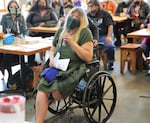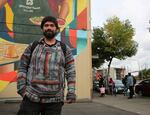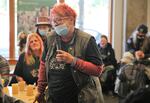
Jennifer Bradford told Portland Mayor Ted Wheeler and Commissioner Dan Ryan at a meeting Nov. 1, 2022 hosted by the homeless nonprofit Street Roots that she was glad the city leaders had come to hear people speak.
Kristian Foden-Vencil / OPB
People living along Portland’s sidewalks and parks got a chance to tell city leaders how they feel about a proposed camping ban Tuesday.
Most opposed the idea and said people who aren’t homeless have little understanding of the problems they face.
Last week, the city held a seven-hour public meeting on its plan to ban street camping; create large government camp sites instead; and build more affordable housing.
But opponents of the mayor’s latest plan to address homelessness complained that business interests were invited to speak first at the City Council meeting, meaning the first hour was dominated by people who favored the proposed ban.
So the nonprofit Street Roots and a coalition of homeless advocacy groups held their own meeting Tuesday to let people living outdoors speak directly to Mayor Ted Wheeler and Commissioner Dan Ryan.

Christopher Brown was living under a Portland bridge last year. He was among a number of people who spoke to Mayor Ted Wheeler and City Commissioner Dan Ryan about their latest homeless proposals at a meeting Nov. 1, 2022. “I agree that we should have safe places for people to go to, but not big tent cities," Brown said. “We have to understand that not everyone on the streets is the same.”
Kristian Foden-Vencil / OPB
“I agree that we should have safe places for people to go to, but not big tent cities,” said Christopher Brown, who lived under the Tilikum Crossing last year.
He was one of many speakers who said a ban on camping would hurt people.
“It’s going to lump our mentally ill with our quiet (residents),” said Brown. “We have to understand that not everyone on the streets is the same.”
Several people told the mayor that smaller camps of perhaps 30 or 40 people each might be better than packing hundreds of people on one site. They said with more people come greater security concerns. The plan Wheeler and Ryan have proposed would create three camps that could range from 150 to 500 people.
Becky Lange said large camps run by the government is a terrible idea.
“I mean three camps of 500 people! An internment camp is a group where you put people who have not committed a crime, but they’re a member of a group that’s found distasteful or unwanted,” Lange said. “Sounds like what you’re doing here.”

At a meeting hosted by Street Roots on Nov. 1, 2022, Becky Lange voiced her opposition to plans to move Portlanders experiencing homelessness onto a few large camping sites. "An internment camp is a group where you put people who have not committed a crime, but they’re a member of a group that’s found distasteful or unwanted," Lange said. "Sounds like what you’re doing here.”
Kristian Foden-Vencil / OPB
Vince Masiello has lived at the Right 2 Dream homeless village for about three months. It can accommodate about 40 people a night. He thinks many smaller villages like Right 2 Dream would be a safer approach than having a few very large government-run camps.
“I believe making camps about that size, 40, is a lot safer,” said Masiello. “It’s a lot less work to deal with as far as getting so many people to get along in a place with only so many resources.”
The meeting was hosted by many of the nonprofits that work with unhoused people including AfroVillage PDX, Blanchet House, Gather: Make: Shelter, Ground Score Association, Hygiene4All, JOIN and numerous others.
Wheeler and Ryan both attended the meeting, but didn’t talk or take questions from the media afterwards.
The meeting was not announced to the public and attendees had to be on a list to be allowed in. Organizers said that was to keep the meeting “stable” for unhoused participants and not be overrun.
Camping ban supporters have said the proposal will turn around the crisis playing out on Portland’s streets. Polls show many voters feel the proliferation of homeless tents across Portland is a major concern heading into this month’s election.
Business and real estate interests are urging city commissioners to vote “yes” on the mayor’s plan. Supporters include restaurant and hospitality advocacy groups and Oregon Business & Industry.
Last month, a group of individuals with disabilities sued the city, arguing tents blocking sidewalk access amounts to a violation of the Americans with Disabilities Act. Speaking then, the lead plaintiff in the suit Tiana Tozer said: “It’s not OK to criminalize homelessness, but neither is it OK to trap people with disabilities in their homes,” she said. “We, your constituents with disabilities, are here today to ask for you to provide the access that is our right under the ADA.”
The homelessness plan is scheduled for a final vote Thursday.
